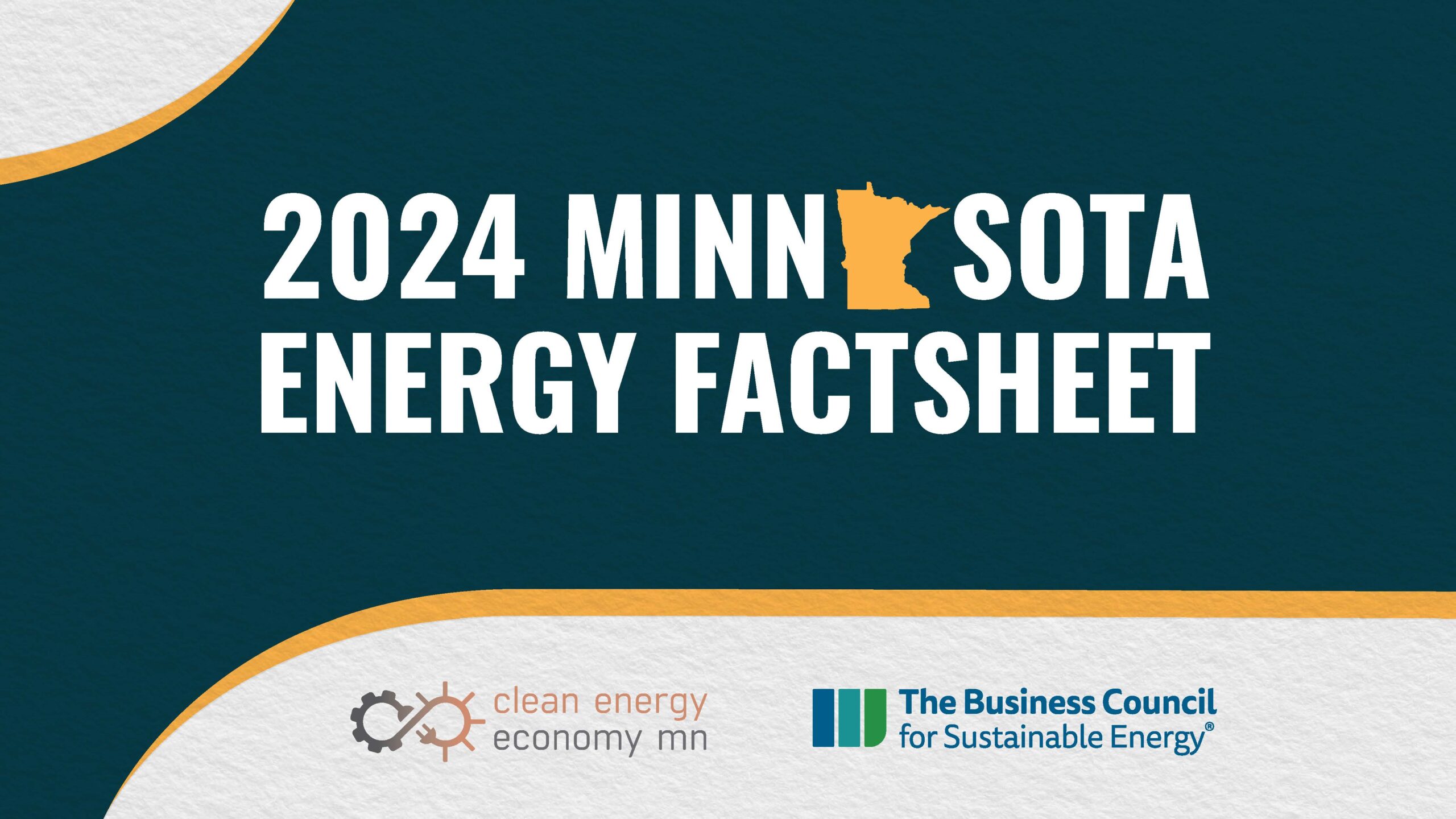NEW REPORT: Minnesota Demonstrates Significant Clean Energy Progress and Leadership
Carbon emissions drop 10% as state heads toward zero-carbon power generation
MINNEAPOLIS — Minnesota has once again proven itself a leader in the clean energy transition, with the 2024 Minnesota Energy Factsheet showing that zero-carbon power generated 54% of the state’s electricity in 2023. The report, released today by Clean Energy Economy Minnesota (CEEM) and the Business Council for Sustainable Energy (BCSE), marks the fourth consecutive year that zero-carbon power has made up the majority of Minnesota’s electricity (54%), compared to the national share of carbon-free power at just 41%.
Highlights from this year’s Factsheet include:
- Carbon emissions reductions: Minnesota’s power sector carbon emissions are down 54% below 2005 levels, outpacing the national reduction of 42%. The state achieved a 10% reduction in power sector emissions over the last year alone.
- Renewable energy milestones: Renewable sources contributed to one-third of the state’s electricity generation in 2023, showcasing a significant move toward cleaner energy alternatives.
- Electric vehicle adoption: A surge in electric vehicle registrations, with a 55% increase from 2022, underscores Minnesotans’ growing preference for sustainable transportation options.
- Advancements in hydrogen energy: Electrolyzer shipments, including from Minnesota-based Cummins, saw a dramatic rise in 2023, bolstered by incentives from the federal Inflation Reduction Act (IRA).
- Growth in renewable energy capacity: Over the past five years, Minnesota added 2.2 GW of renewable energy capacity while reducing coal dependency by 1.2 GW.
- Increased energy productivity: Minnesota has enhanced its energy productivity by 33% since 2001, emphasizing efficiency and innovation in its energy use.
- Zero-carbon electricity already powers Minnesota: For the fourth consecutive year, zero-carbon sources provided the majority of Minnesota’s electricity, with 54% coming from zero-carbon sources in 2023.
“This year’s factsheet is a testament to Minnesota’s leadership and commitment to an energy system that is sustainable and secure,” said Gregg Mast, Executive Director of Clean Energy Economy MN. “Our achievements in reducing power sector emissions, expanding renewable energy deployment, and leading the charge in electric vehicle adoption are a result of strong policy and business innovation at the state and local level.”
“Minnesota’s clean energy transition leads the Midwest, and the rest of the country is taking notice,” said Lisa Jacobson, President of BCSE. “Already supplying the state with most of its energy, Minnesota continues to lead on clean energy and energy efficiency deployment, with significant investment happening throughout the state.”
“With Minnesota’s drive to reach 100% clean energy by 2040, the state is leading the nation in delivering the benefits of an equitable clean energy future for all—from reducing pollution and improving quality of life to creating jobs and economic prosperity for more Minnesotans,” said Sarah Christiansen, Director of the McKnight Foundation’s Midwest Climate & Energy program. “In this critical moment for building a clean economy, for bringing together state and federal resources, and for collaborating boldly across sectors, the coasts and the globe are looking to Minnesota for how to get things done.”
“Minnesota is moving our Climate Action Framework into action by supporting Minnesota’s clean energy businesses with historic investments – whether through the new Energy Alley, through partnerships to bring in billions of Federal dollars, or through programs like Solar for Schools,” said Grace Arnold, Minnesota Department of Commerce Commissioner. “The data released today show the success of public and private sectors working together to grow Minnesota’s clean energy economy.”
“We have witnessed what started in Minnesota years ago as a community solar garden program has now spread across the country. As a result, numerous Minnesota businesses have grown to become leaders in the solar industry and take on increasingly noteworthy projects,” said Andy Kim, President of EVS, Inc. “This year’s Superbowl (in Las Vegas) was the first-ever to be powered entirely by renewable energy, an award-winning project for which EVS was proud to be the engineer of record.”
“Each year the Sustainable Energy in America Factbook and Minnesota Factsheet provides important data driven insights into the progression of the clean energy transition. This year is no exception,” said Ken Smith, President and CEO at District Energy. “The rapid decarbonization of Minnesota’s power sector is providing exciting pathways to accelerate the decarbonization of individual buildings and entire communities and campuses.”
The Factsheet is a companion to the 2024 Sustainable Energy in America Factbook, which provides valuable year-over-year data and insights on the American energy transformation. Both resources are commissioned by the Business Council for Sustainable Energy (BCSE) with research by BloombergNEF. The Minnesota Energy Factsheet is made possible with the support of the McKnight Foundation.
Download the 2024 Minnesota Energy Factsheet today.
Media Contacts
| Lizzie Stricklin Business Council for Sustainable Energy 202.785.0507 x 1504 lstricklin@bcse.org |
Peter Ingraham Clean Energy Economy Minnesota 651.285.3917 pingraham@cleanenergyeconomymn.org |
About Clean Energy Economy Minnesota (CEEM): CEEM is an industry-led 501(c)(3) nonprofit representing the business voice for clean energy in Minnesota. CEEM provides a unified voice for clean energy business across the state. Our mission is to provide educational leadership, collaboration, and policy analysis that accelerates clean energy market growth and smart energy policies. Learn more at cleanenergyeconomymn.org.
About the Business Council for Sustainable Energy (BCSE): BCSE is a trade association representing clean energy and decarbonization solutions, with a sector focus on the energy efficiency, natural gas, and renewable energy sectors. Established in 1992, BCSE advocates for policies at the state, federal, and international level that promote the deployment of the full portfolio of commercially available clean energy products, technologies, and services. Learn more at bcse.org.

